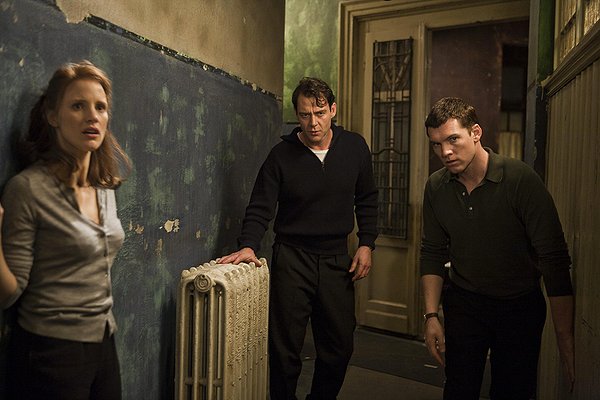The Debt
 Directed by: John Madden
Directed by: John Madden
Starring: Helen Mirren, Ciaran Hinds, Tom Wilkinson, Sam Worthington, Jessica Chastain, Marton Csokas
Rated: R for some violence and language
Moral ambiguity is a staple of the espionage thriller genre. Spies, assassins, and their targets and employers tend not to be people at the all-good end of the ethical spectrum. “The Debt” takes that idea and runs with it, but rather than making for a thought-provoking, exciting film, it turns into a potentially very uncomfortable one.
“The Debt” follows two storylines: in 1997, two ex-Mossad agents are lauded as their daughter’s book about their greatest mission is launched. Rachel (Helen Mirren) and Stefan (Tom Wilkinson), along with their colleague David (Ciaran Hinds), risked their lives thirty years before when the three of them tracked down Nazi war criminal Dieter Vogel in East Berlin. Their memories and stories from the mission are interwoven with the latter-day events as distressing news related to those fateful weeks reaches them.
The 1966 mission was full of catastrophes, and the agents struggled to find ways to complete their task without losing their humanity. It’s an engaging tale — the young David (Sam Worthington) and Rachel (Jessica Chastain) are compelling and sympathetic, and as Stefan (Marton Csokas) shows his callous, ambitious colors everything teeters on a knife’s edge. There is a strong seam of classical tragedy here, in which characters are doomed by flaws springing from their best qualities.
The performances are stellar — even Worthington, whose performance in “Avatar” was so flat it was a relief when he was masked with CGI, does good work. Mirren and Wilkinson are as excellent as ever, giving us glimpses of their characters’ complexity even in the short amount of screentime they have to work. Hinds is given almost no scenes, and wanders through them like a man already dead.
It makes for a compelling thriller. Where “The Debt” falls apart is its apparent agreement with a speech by Vogel about why the Jews deserved to be exterminated in the camps. He says in one of his manipulative, one-sided conversations with his captors that the prisoners in Birkenau could have overwhelmed their guards with sheer numbers, but none of them were willing to die for the sake of their fellows — it only took four guards to lead thousands to the gas chambers because none of them were willing to die to save the rest.
It is, of course, appalling, victim-blaming stuff. And yet, Stefan, Rachel, and David all seem to prove him right over the course of the film. It’s hard to describe in much detail without spoiling the film, but here goes. Each of the three give altruistic reasons for their actions, but all their pivotal, plot-changing decisions are driven by self-serving passivity in the face of danger. There’s talk about serving the greater good, but ultimately they all do what makes their own lives easier.
It makes for an uncomfortable film. Any movie which seems to be agreeing with a character called “the surgeon of Birkenau,” who performed unspeakable experiments on his prisoners, is very hard to enjoy.
It’s a pity, because everything else about the film is very well-done. Whether or not you’ll enjoy it has more to do with how you interpret the character’s actions than how the film was made. Personally, it made me want to go home and take a shower.